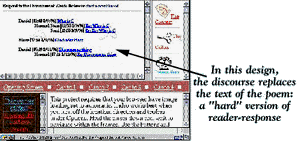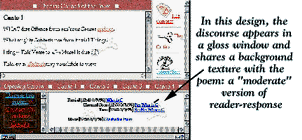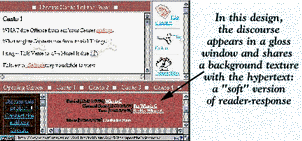| The first major analysis outlines reader-response theory and talks about how interpretive dialog might replace the text of the poem. | |
|---|---|
| Reader-response theory suggests that the meaning of a
text is to be found not in the text itself, but in the interpretations that
readers construct about the text. Stanley Fish popularized this thinking
throughout the 80s. Fish himself received some response from readers like E.D.
Hirsch and M.H. Abrams, who said, "wait a minute!" If the meaning is to be found
in readers' interpretations, what's to prevent an infinite plurality of
meanings?
|
|
| The second design for the project suggests an equivalence between the text and the discussion about it | |
|---|---|
| Underlying
the idea that meaning issues from interpretive communities is the suggestion that
the world as we know it is socially constructed. Social construction, often
drawing on theorists like Fish or the philosopher Richard Rorty, tries to build a
foundation for knowledge that moves beyond reliance on traditional western
metaphysics. We need to use care, however, when we define the social context
that founds our conceptions of meaning and the world. In fact, determining just
what the social context is entails a complex analyses. It turns out that
artifacts like poems are also a part of the social context. Social interactions
influence the material world and the material world impacts our interactions.
|
|
| The final design for the project aligns the discussion about the poem with the hypertext itself | |
|---|---|
| That interpretive
communities construct knowledge about a text seems a valuable insight for someone
trying to teach literature or critical thinking. But these theories tend toward
the abstract. The discourse may construct meaning about the poem, but the place
where this happens and what this actual construction might look like are somewhat
obscure. Joseph Harris notes that the communities that theorists refer to are "all quite literally utopias--nowheres, metacommunities..." Harris continues, "[f]or all the scrutiny it has drawn, the idea of community still remains little more than a notion--hypothetical and suggestive, powerful yet ill-defined"
|
|
 To counter this
possibility, Fish posits interpretive communities. These communities consist of
like-minded people who share ways of talking about the text. Rather than any
number of possible meanings, the meaning of the text will emerge from the
discourse of the interpretive community. The screen from this possible
implementation of the Rape of the Lock project shows how the interpretive
community concept can be pushed to the extreme. The main window in this design
normally would display the text of the poem. However, when a reader chooses to
discuss or look at a discussion, the dialog replaces the text of the poem in the
window. I call this a hard version of reader-response.
To counter this
possibility, Fish posits interpretive communities. These communities consist of
like-minded people who share ways of talking about the text. Rather than any
number of possible meanings, the meaning of the text will emerge from the
discourse of the interpretive community. The screen from this possible
implementation of the Rape of the Lock project shows how the interpretive
community concept can be pushed to the extreme. The main window in this design
normally would display the text of the poem. However, when a reader chooses to
discuss or look at a discussion, the dialog replaces the text of the poem in the
window. I call this a hard version of reader-response. With this in mind, the project was
revised to place the social dialog about the poem in conversation with the poem
itself. The main window in this design continues to display the text of the
poem. Now, when discussion takes place, it happens in the gloss window below the
text. To counter the possible privileging of the original poem, the background
textures of the gloss and the poem window are made identical, suggesting an
equivalence between the original poem and the discussions about it. I call this a
moderate version of reader-response.
With this in mind, the project was
revised to place the social dialog about the poem in conversation with the poem
itself. The main window in this design continues to display the text of the
poem. Now, when discussion takes place, it happens in the gloss window below the
text. To counter the possible privileging of the original poem, the background
textures of the gloss and the poem window are made identical, suggesting an
equivalence between the original poem and the discussions about it. I call this a
moderate version of reader-response. Additionally, the interpretations
that the community constructs can often be mainly suggestive. When the poem and
the discussion about it are essentialized, either in the metaphor of conversation
or as communities of texts, the possibility of abstraction sets in. It may be
that playing down the differences between the poem and the talk avoids
considering the complexities of text and context, the social and the material.
So, the final version of the project places the discussion of the poem in the
gloss window, but uses the background texture of the hypertext. The suggestion is
that it is the hypertext that instantiates the metatext; moving away from the
equivalence of texts in conversation to a concretion of meaning in the
hypertext. I call this a soft version of reader-response.
Additionally, the interpretations
that the community constructs can often be mainly suggestive. When the poem and
the discussion about it are essentialized, either in the metaphor of conversation
or as communities of texts, the possibility of abstraction sets in. It may be
that playing down the differences between the poem and the talk avoids
considering the complexities of text and context, the social and the material.
So, the final version of the project places the discussion of the poem in the
gloss window, but uses the background texture of the hypertext. The suggestion is
that it is the hypertext that instantiates the metatext; moving away from the
equivalence of texts in conversation to a concretion of meaning in the
hypertext. I call this a soft version of reader-response.